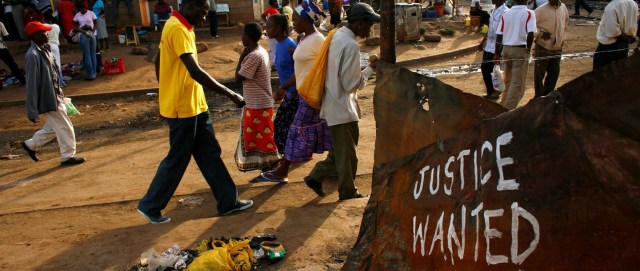Stephen Smith Cody joins JiC for this post discussing a recently released, timely, and must-read report on victim’s expectations with, and engagement at, the ICC: The Victim’s Court – A Study of 622 Victim Participants at the International Criminal Court.
Many victims of war crimes and other atrocities have said they are disappointed in the International Criminal Court (ICC). As one victim said: “The court hears the voices of the people who perpetrated this violence, not the victims.” In a study of ICC victims, released this week at the Assembly of States Parties Conference in The Hague, we document the concerns of more than 600 of them.
Our findings suggest that the ICC has reached a critical juncture: It must invest in greater outreach and education programs to give victims the tools to meaningfully participate in trials or accept that it’s failing to meet its mandate to include them.
Our study shows that most victims participating in the court have insufficient knowledge to make informed decisions about their cases, rarely meet with court personnel, and feel frustration at the lengthy trial process, which can go on for years. “As victims, we do not understand. We need more information so we understand our case. Intermediaries are struggling to inform us. They provide information when they have it, but the problem is to reach us. Their means are limited. There are not enough efforts to keep the victims informed,” explained one victim.
When the Rome Statute created the ICC in 1998, it promised survivors of mass violence a new kind of international court—one that would give them an influential voice in criminal trials. Many at the court have made admirable efforts in The Hague and in victims’ communities to realize this promise, but much more needs to be done.
Unlike other courts where victims only testify as witnesses during trial, the ICC gives victims the right to present their views to judges at various stages of the proceedings, and even question witnesses during trials, so long as judges determine that they are exercising these rights in a manner consistent with a fair trial for the accused. Victims also have a right to receive reparations, including individual compensation in some cases.
These victim-centered innovations—controversial and vigorously debated during the Rome Statute negotiations—reflect a growing consensus that international criminal courts should not just punish the guilty, but also ensure that the voices of victims are heard.
But our study shows this experiment in international criminal justice is not fully succeeding, at least not yet. Our interviews in Uganda, Democratic Republic of Congo, Kenya, and Côte d’Ivoire show that ICC prosecutions to date have scarcely affected victims’ the daily lives. Others say the court built up hopes of convictions and reparations only to disappoint them.
Victims’ said that their satisfaction with international justice depends largely on their personal interactions with court personnel and feedback on their cases. Regular contact and communication can be even more important to victims than securing convictions of high-level perpetrators, who victims may see as less responsible for violence than local offenders.
While victims overwhelmingly said that ICC staff treated them in a professional manner, most said they had only met with members of the court once or twice. Some had only interacted with court intermediaries—community leaders selected to represent victims’ views—which left the impression that judges and other high-ranking officials did not value their views and their testimony. Victims living in rural areas had the least contact with the court.
Without regular updates from court staff, most victims had limited access to information about court developments and inadequate knowledge to make informed decisions about their participation in cases. Few knew the location of the court’s headquarters and many believed the ICC was an aid organization rather than a criminal court.
Perhaps the greatest disappointment for victims was the court’s inability to deliver material assistance. Most victims in Uganda and Democratic Republic of Congo, for example, said they joined the ICC cases to receive individual reparations, not to express their views in legal proceedings.
The long duration of cases also frustrates victims, who can spend years waiting on arrests or judicial decisions. The waiting is made harder without news from the court. Some victims say they worry that they will die before verdicts or reparation decisions.
In light of these findings, the time has come for States Parties who fund the ICC to pony up and give court staff, particularly those working in victims’ home countries, the resources to meet the court’s legal obligation to include victims in ICC cases. Victims want regular opportunities to learn about, discuss, and debate ICC activities and developments. And they have a right to them.
As it stands, the ICC demands a lot of survivors, and so far it delivers little in return. It’s not yet a victims’ court, but it could happen.



Pingback: ASP 14 Day 4: Making victims heard |
Pingback: AEP 14 – 4e Jour : Faire entendre la voix des victimes |